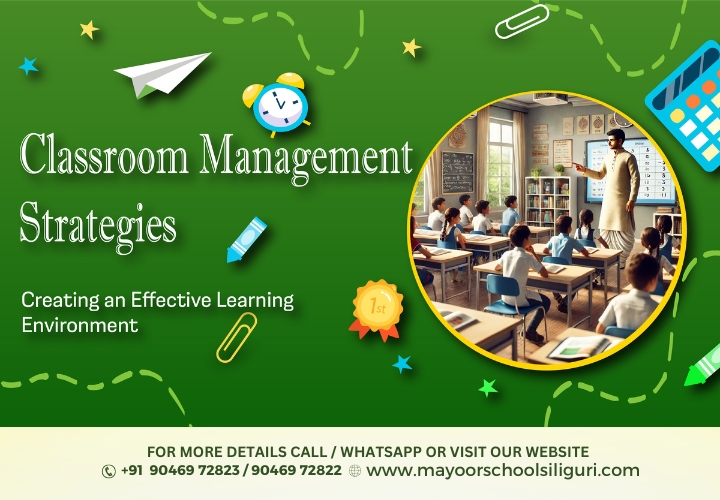Creating an effective learning environment is essential for the success
of both students and teachers. Effective classroom management
strategies not only minimize disruptions but also enhance students’
engagement, motivation, and learning outcomes. Below, we'll explore how Mayoor
School Siliguri’s classroom management strategies are helpful to educators.
1. Establish Clear
Expectations and Rules
One of the foundational steps in classroom management is establishing
clear expectations and rules from the beginning. The teachers should clearly define
the rules to help students understand what is expected of them and the
consequences of not adhering to these expectations. So, you can consider the
following steps in creating a learning environment inside the classroom:
- Be Consistent: There should be
consistency in enforcing the rules inside the classroom. Inconsistent
enforcement can lead to confusion and misbehaviour.
- Visual Reminders: Display the rules
prominently in the classroom through art and craft on the soft boards to
serve as a constant reminder for the students.
2. Build Positive
Relationships
For a positive classroom atmosphere, building positive
relationships with students is a must. When students feel respected and valued,
they are more likely to engage positively in the classroom. Here are the strategies
to build positive relationships with students:
- Show Interest: Invest time to
learn and know about your students' interests, strengths, and challenges.
- Be Approachable: You should create
a supportive atmosphere where students feel comfortable sharing their
thoughts and concerns. For Example- Circle Time (a period in the
school day when young children gather in a circle along with a teacher to
participate in a discussion.)
- Celebrate Success: The teacher must
recognize and celebrate students’ achievements, no matter how small the
achievement is.
3. Design an Engaging
Curriculum
An engaging curriculum captures students' interest and reduces the
likelihood of disruptive behaviour. Here are some ways to design an engaging
curriculum:
- Interactive Lessons: Incorporate
interactive and hands-on activities that cater to different learning
styles.
- Real-World Connections: You must relate
the lessons to real-world scenarios. For examples- Theme-Based Learning (to
make learning more relevant, practical and interesting.)
4. Implement Effective
Teaching Practices
Classroom tips for teachers are essential for
maintaining an orderly classroom. These practices include:
- Clear Instructions: Provide clear,
concise instructions and check for understanding before moving on.
- Active Supervision: Move around the
classroom to monitor student behaviour and provide assistance as needed.
- Time Management: Plan lessons
with a clear structure and keep smooth and quick transitions between
activities.
5. Utilize Positive
Reinforcement & Foster Community
Positive reinforcement encourages desired behaviours by rewarding
students when they meet expectations. Some positive reinforcement strategies
include:
- Praise: Offer specific and genuine praise for
good behaviour and academic efforts.
- Rewards Cards: Implement a
reward card giving policy where students can earn reward cards for
positive behaviour and classroom activity.
- Group Work: Encourage the students to work in group
to enhance their team spirit and learn life skills through teamwork.
- Peer Support: Promote peer
support and mentoring programs within the classroom.
6. Address Code of Conduct Effectively
Despite the best efforts, misbehaviour can still occur. Addressing it
effectively is key to maintaining a positive learning environment. Consider the
following strategies:
- Stay Calm: The teacher must remain calm when
addressing misbehaviour for the first time to avoid escalation of the
situation.
- Private Conversations: Whenever
possible, address issues privately to avoid embarrassing the student in
front of peers.
- Logical Consequences: Implement
logical consequences that are directly related to the misbehaviour and
help students learn from their mistakes.
These steps will make the school a place for an effective learning
environment.
Conclusion
Apart from effective teaching methods, effective classroom
management is a multifaceted approach. Mayoor School Siliguri incorporates
these strategies, and our educators are committed to create a positive and
productive learning environment where all students have the opportunity to
succeed.
Read More: Rohit Sharma Cricket Academy: Excellence in Cricket Coaching for Students Now at Mayoor School Siliguri
Posted On: 21/06/2024
